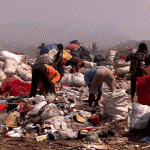Recycle, Reuse, and Respect
 We Americans are spoiled. We have unemployed people and bail them out and give them money. In India unemployed people earn a living by recycling trash saving the cities from becoming a toxic waste dump. In Dharavi, unemployed workers, mainly children sift through and collect 8.5 million metric tons of garbage and trash everyday for recycling and repurposing.
We Americans are spoiled. We have unemployed people and bail them out and give them money. In India unemployed people earn a living by recycling trash saving the cities from becoming a toxic waste dump. In Dharavi, unemployed workers, mainly children sift through and collect 8.5 million metric tons of garbage and trash everyday for recycling and repurposing.
In America, what parent would allow their child to sift through garbage? Americans would rather have a handout than pick up trash for recycling. In America trash-pickers, dumpster divers and homeless are often looked at with fear and loathing. Personally dumpster divers and homeless do a favor for some, they recycle products that most people carelessly throw away.
In India, The Acorn Foundation India Trust aims to organise ragpickers and train them in scientific methods of waste handling, segregation and recycling, bringing a measure of respect to their work. If it wasn’t for the ragpickers Dharavi’s would be one giant toxic waste dump.
Now there’s an initiative afoot to bestow a fourth R on the ragpicker brigade—respect. The Acorn Foundation India Trust is set to organise these workers and train them in scientific methods of waste handling, segregation and recycling. “We want to highlight their work in protection of the environment,” says Vinod Shetty of the Acorn Foundation. “We want the government to set up a board whereby polluters pay a cess of about one per cent which can go towards giving these ragpickers a proper income with safe equipment like gloves and other amenities. We want them to be trained in how to handle toxic waste and expertise in recycling goods in a non-hazardous way.”
For a start, all members of the Dharavi Project are being given identity cards. They have formed their own committee which is involved in waste awareness programmes. In one programme, young ragpickers are partnering with schools in waste management. Currently there are some 350 members of the Dharavi Project.
The foundation has also undertaken another initiative— to organise health clinics, programmes and workshops from which young children engaged in ragpicking can get some kind of informal education in music, photography and other arts. A number of artistes have participated in such programmes, among them singers Shankar Mahadevan, Sunita Rao and Apache Indian and Katrina Kaif. “Nearly 40 per cent of those in the waste business are children and women,” says Shetty. “We do not want to support child labour but realise that this sector needs alternatives. We hope such cultural events will help them think differently.”Now there’s an initiative afoot to bestow a fourth R on the ragpicker brigade—respect. The Acorn Foundation India Trust is set to organise these workers and train them in scientific methods of waste handling, segregation and recycling. “We want to highlight their work in protection of the environment,” says Vinod Shetty of the Acorn Foundation. “We want the government to set up a board whereby polluters pay a cess of about one per cent which can go towards giving these ragpickers a proper income with safe equipment like gloves and other amenities. We want them to be trained in how to handle toxic waste and expertise in recycling goods in a non-hazardous way.”
For a start, all members of the Dharavi Project are being given identity cards. They have formed their own committee which is involved in waste awareness programmes. In one programme, young ragpickers are partnering with schools in waste management. Currently there are some 350 members of the Dharavi Project.
Read more at India Together

What a great resource!
Personally, I think that there should be more community initiatives to properly train school aged children as well as adults in recycling and going through their own trash at least.
the sad part is how hard they work and yet they are living like an undeveloped country. No toilets, running water, plumbing, schools, electricity, etc.
if we want clean city from garbage or save our nature from plastic, find way after collecting the garbage how to disposal or recycle or pass on to the industries who is in field of such business…?
Garbage in Dharavi India often contains medical waste and people do get sick and die. Needs to be a better system then using Dharavi? Recycling is great but not at the cost of human life.
People need to be moved to a better location and place demolished.